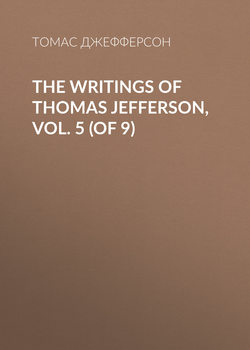Читать книгу The Writings of Thomas Jefferson, Vol. 5 (of 9) - Томас Джефферсон, Thomas Jefferson - Страница 43
TO JAMES MONROE
ОглавлениеWashington, March 21, 1807.
Dear Sir,—A copy of the treaty with Great Britain came to Mr. Erskine's hands on the last day of the session of Congress, which he immediately communicated to us; and since that Mr. Purviance has arrived with an original. On the subject of it you will receive a letter from the Secretary of State, of about this date, and one more in detail hereafter. I should not have written, but that I perceive uncommon efforts, and with uncommon wickedness, are making by the federal papers to produce mischief between myself, personally, and our negotiators; and also to irritate the British government, by putting a thousand speeches into my mouth, not one word of which I ever uttered. I have, therefore, thought it safe to guard you, by stating the view which we have given out on the subject of the treaty, in conversation and otherwise; for ours, as you know, is a government which will not tolerate the being kept entirely in the dark, and especially on a subject so interesting as this treaty. We immediately stated in conversation, to the members of the Legislature and others, that having, by a letter received in January, perceived that our ministers might sign a treaty not providing satisfactorily against the impressment of our seamen, we had, on the 3d of February, informed you, that should such an one have been forwarded, it could not be ratified, and recommending, therefore that you should resume negotiations for inserting an article to that effect; that we should hold the treaty in suspense until we could learn from you the result of our instructions, which probably would not be till summer, and then decide on the question of calling the Senate. We observed, too, that a written declaration of the British commissioners, given in at the time of signature, would of itself, unless withdrawn, prevent the acceptance of any treaty, because its effect was to leave us bound by the treaty, and themselves totally unbound. This is the statement we have given out, and nothing more of the contents of the treaty has ever been made known. But depend on it, my dear Sir, that it will be considered as a hard treaty when it is known. The British commissioners appear to have screwed every article as far as it would bear, to have taken everything, and yielded nothing. Take out the eleventh article, and the evil of all the others so much overweighs the good, that we should be glad to expunge the whole. And even the eleventh article admits only that we may enjoy our right to the indirect colonial trade, during the present hostilities. If peace is made this year, and war resumed the next, the benefit of this stipulation is gone, and yet we are bound for ten years, to pass no non-importation or non-intercourse laws, nor take any other measures to restrain the unjust pretensions and practices of the British. But on this you will hear from the Secretary of State. If the treaty can not be put into acceptable form, then the next best thing is to back out of the negotiation as well as we can, letting that die away insensibly; but, in the meantime, agreeing informally, that both parties shall act on the principles of the treaty, so as to preserve that friendly understanding which we sincerely desire, until the one or the other may be deposed to yield the points which divide us. This will leave you to follow your desire of coming home, as soon as you see that the amendment of the treaty is desperate. The power of continuing the negotiations will pass over to Mr. Pinckney, who, by procrastinations, can let it die away, and give us time, the most precious of all things to us. The government of New Orleans is still without such a head as I wish. The salary of five thousand dollars is too small; but I am assured the Orleans legislature would make it adequate, would you accept it. It is the second office in the United States in importance, and I am still in hopes you will accept it. It is impossible to let you stay at home while the public has so much need of talents. I am writing under a severe indisposition of periodical headache, without scarcely command enough of my mind to know what I write. As a part of this letter concerns Mr. Pinckney as well as yourself, be so good as to communicate so much of it to him; and with my best respects to him, to Mrs. Monroe and your daughter, be assured yourself, in all cases, of my constant and affectionate friendship and attachment.
